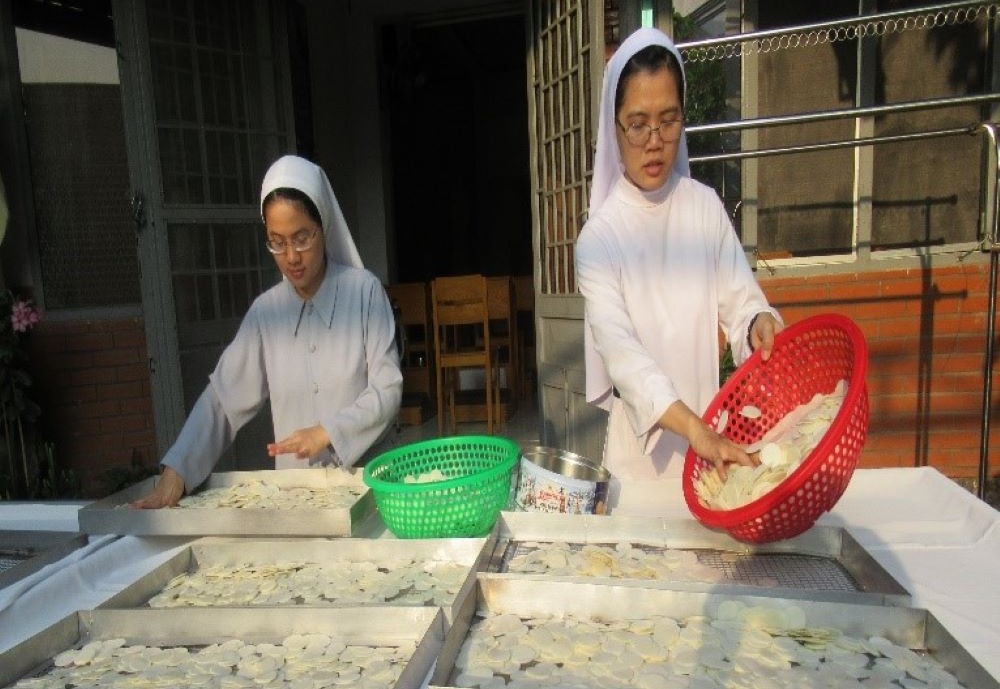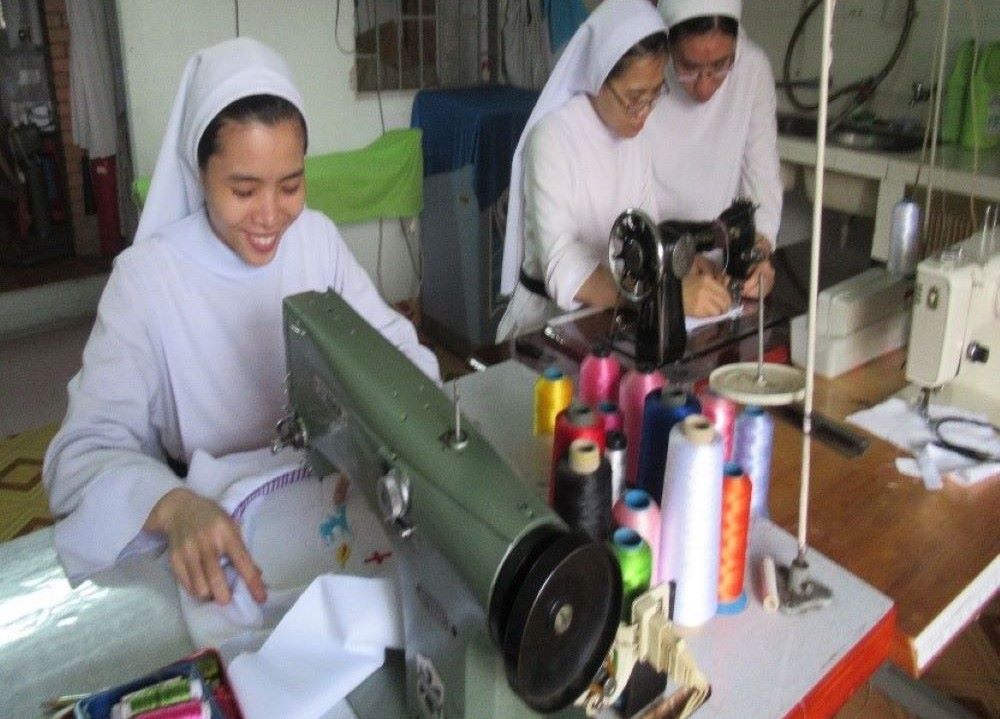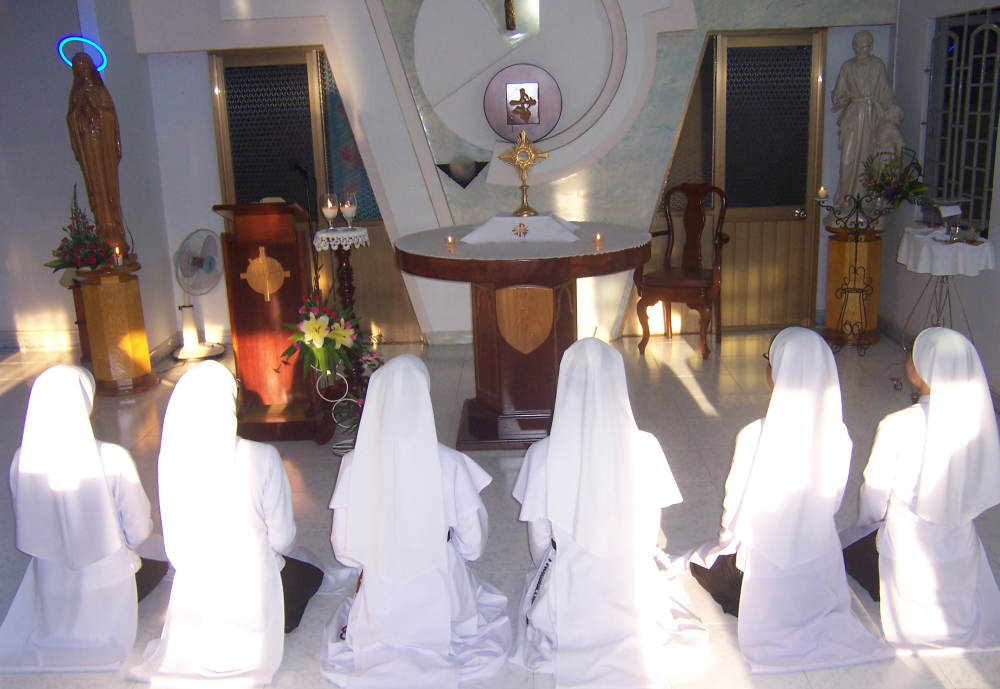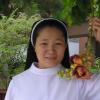
Sisters at the Monastery of Our Lady of the Holy Spirit make Communion wafers. The Dominican monastery in Xuan Loc Diocese, Vietnam, celebrated its 10th anniversary Aug. 10. (Mary Nguyen)
On my way to daily Mass at the parish each morning, a laywoman often walks with me. She recently shared that she had been invited to a thanksgiving Mass celebrating the 10th anniversary of a Dominican monastery's establishment and development at Ngu Phuc parish, Xuan Loc Diocese. She then said, "The sisters there don't have classes for children like other congregations in Vietnam, and they don't go out to communicate or work. How do they support themselves in the monastery day by day?" I didn't know how to answer because I had never visited the monastery and did not know much about monastic life.
The Monastery of Our Lady of the Holy Spirit was officially established in the Xuan Loc Diocese Jan. 9, 2014. The decree was approved and signed by Bishop Dominic Nguyen Chu Trinh of Xuan Loc. It is the first and only Dominican monastery in Vietnam, and it belongs to Ngu Phuc parish. The monastery includes 10 perpetually professed sisters, 7 temporarily professed sisters, 2 novices and 1 postulant.
On April 10, the day of the 10th anniversary celebration, the sisters gave thanks to God and prayed for their benefactors who have supported them in their religious life.
I learned from Sister Sophia and her sisters to unite with God whenever I work, no matter how small or humble it may seem.
One weekend, I had the chance to visit the Dominican monastery. As I stood at the gate and pulled the bell rope, I was surprised to be greeted by Sister Sophia, an old friend. We were so happy to see each other again after many years, although we were only allowed to talk about half an hour. She then took me on a tour. The monastery is not very large, but the space has a cool and quiet atmosphere.
I truly admire the sisters who have chosen monastic life. Many people wish to embrace it, but find it difficult to follow through. Sister Sophia shared that some sisters from other Dominican congregations have visited to try monastic life for a week or a month, but eventually, they decided it wasn't suitable for their vocation.
As Dominican nuns, they must observe the monastic constitution, which requires them to live within the cloister and not leave, wear their habits at all times (both inside and outside the monastery, when allowed), and share common meals. If anyone wishes to eat outside mealtimes, she must ask for permission. They are also not allowed to own cellphones, although they can listen to phone calls. During Lent and Advent, they refrain from seeing guests, but on other days, they may meet with visitors for 15 to 30 minutes, though conversations must stop for prayer times. Each day, they spend six hours in communal prayer and one hour in private prayer. Their day begins at 4:30 a.m., and their prayers run 5 a.m. to 7:30 p.m.

The daily work at the Monastery of Our Lady of the Holy Spirit includes embroidering corporals and baptismal gowns and corporals. (Mary Nguyen)
Thanks to my visit to the monastery, I am able to borrow the words of St. Teresa of the Child Jesus to answer the question of my walking companion: "In the monastery, sisters only do ordinary, humble tasks with extraordinary hearts."
Indeed, the lives of those in the monastery may seem quiet, small and insignificant to others — tasks include sweeping, washing dishes and planting trees — but they do these things to glorify God, sanctify themselves and save souls. Their daily work also includes translating documents and letters from Farmington Hills, Michigan, into Vietnamese so that the sisters can learn more. Additionally, the sisters embroider corporals and baptismal towels, and make Communion wafers. However, the purpose of their work is to share with everyone, especially with the poor. Most importantly, their life is centered on prayer, where they encounter God — not just for their own needs but for the mission of the entire world, for the poor and for the suffering, particularly for the preaching work of the church and their Dominican brothers and sisters.
Advertisement
I truly admire Sister Sophia, who has chosen a monastic vocation and took her perpetual vows four years ago. We had not seen each other for a long time, so we spent some time talking and confiding in each other. I asked her why she chose this vocation. She explained that after taking temporary vows in another Dominican congregation, she felt unfulfilled. After much thought and research, she decided to choose the monastic path, and now she feels at peace and satisfied with her decision.
I also asked her about her most unforgettable memory upon entering the monastery. She shared that when she first arrived to live in the monastery, the house was still pretty rudimentary, with no spacious rooms like today. It was newly established and relatively unknown. Their income was unstable, so food was often scarce. Meals were shared equally, and once the portions were gone, there was no more. She said that although life was hard at first, the sisters loved and sacrificed for one another. They always felt joy and peace in their vocation because they believed God always accompanied them in all situations.

Sisters sit in adoration of the Blessed Sacrament at the Monastery of Our Lady of the Holy Spirit in Xuan Loc Diocese, Vietnam. (Sophia Quy Nguyen)
Listening to Sister Sophia's story filled me with joy and gratitude. God has chosen each of us for different vocations — mine as an active religious and hers as a cloistered nun — but we both serve God and the church in different ways. Hearing her story reassured me that God understands our hearts clearly. No matter how difficult life may become, Sister Sophia has remained firm in her choice to follow God in the monastic path. Her faith strengthens my own conviction to stay faithful to the Lord, who never abandons those who love Him.
I truly believe the words, "It was not you who chose me, but I who chose you" (John 15:16). The religious vocation is a mystery. I believe it was God who chose Sister Sophia to live her monastic vocation. I greatly admire the other sisters as well, who have given up many things — modern conveniences, social media and much of their communication with the outside world — to embrace a cloistered life within the high walls of the monastery. They dedicate their lives to God and spend their time in prayer for the entire world, the poor and those who suffer, as well as for the missionary work of the church.
This visit reminded me of the importance of spending more time in prayer for the poor, the suffering, and the world. I learned from Sister Sophia and her sisters to unite with God whenever I work, no matter how small or humble it may seem. With God, nothing is wasted, as St. Paul said in his letter to the Romans: "We know that all things work for good for those who love God, who are called according to his purpose" (Romans 8:28).





